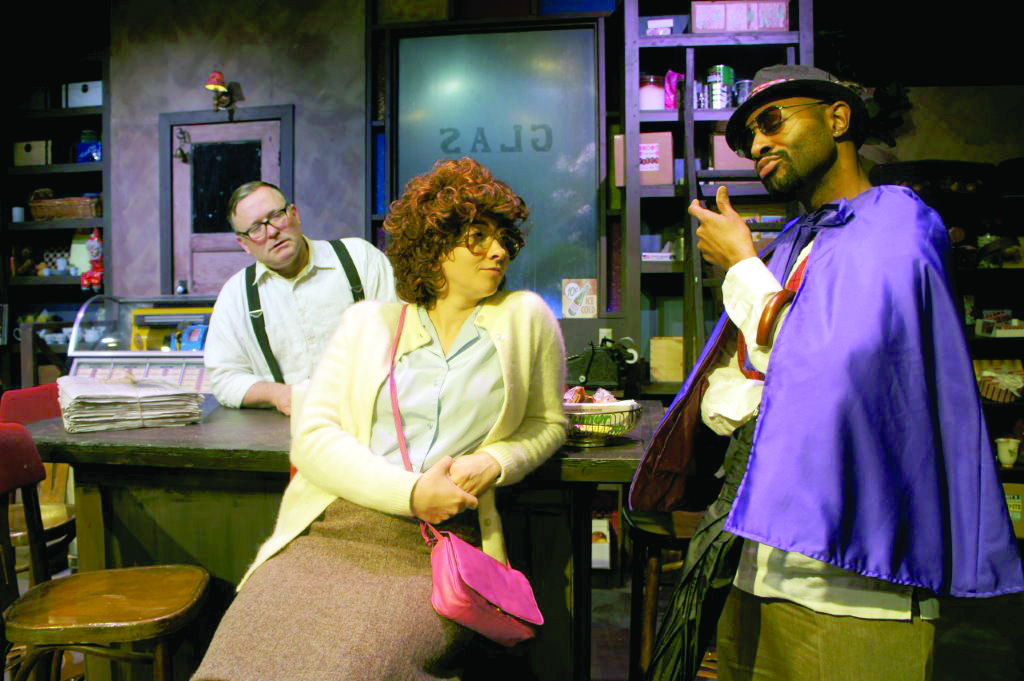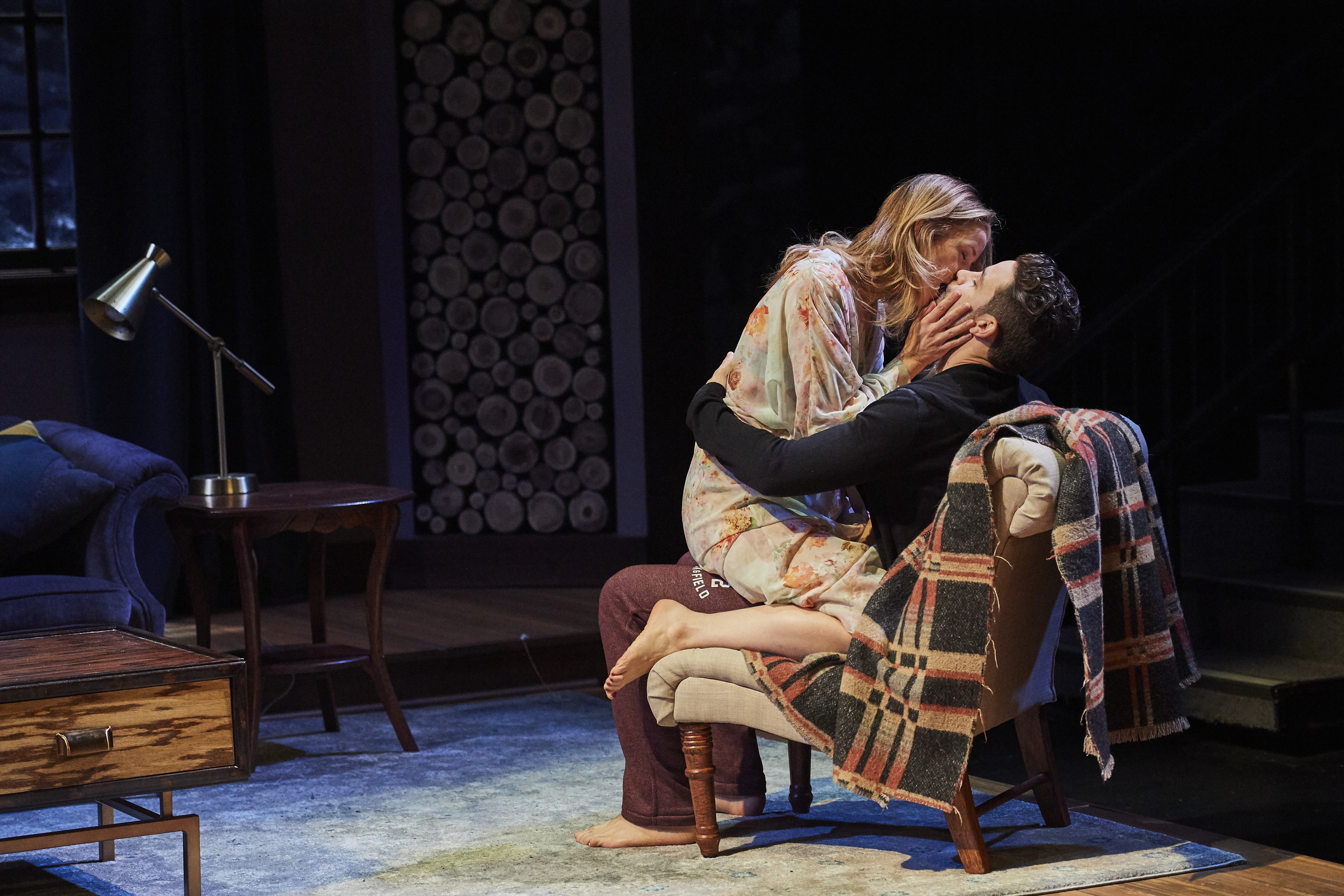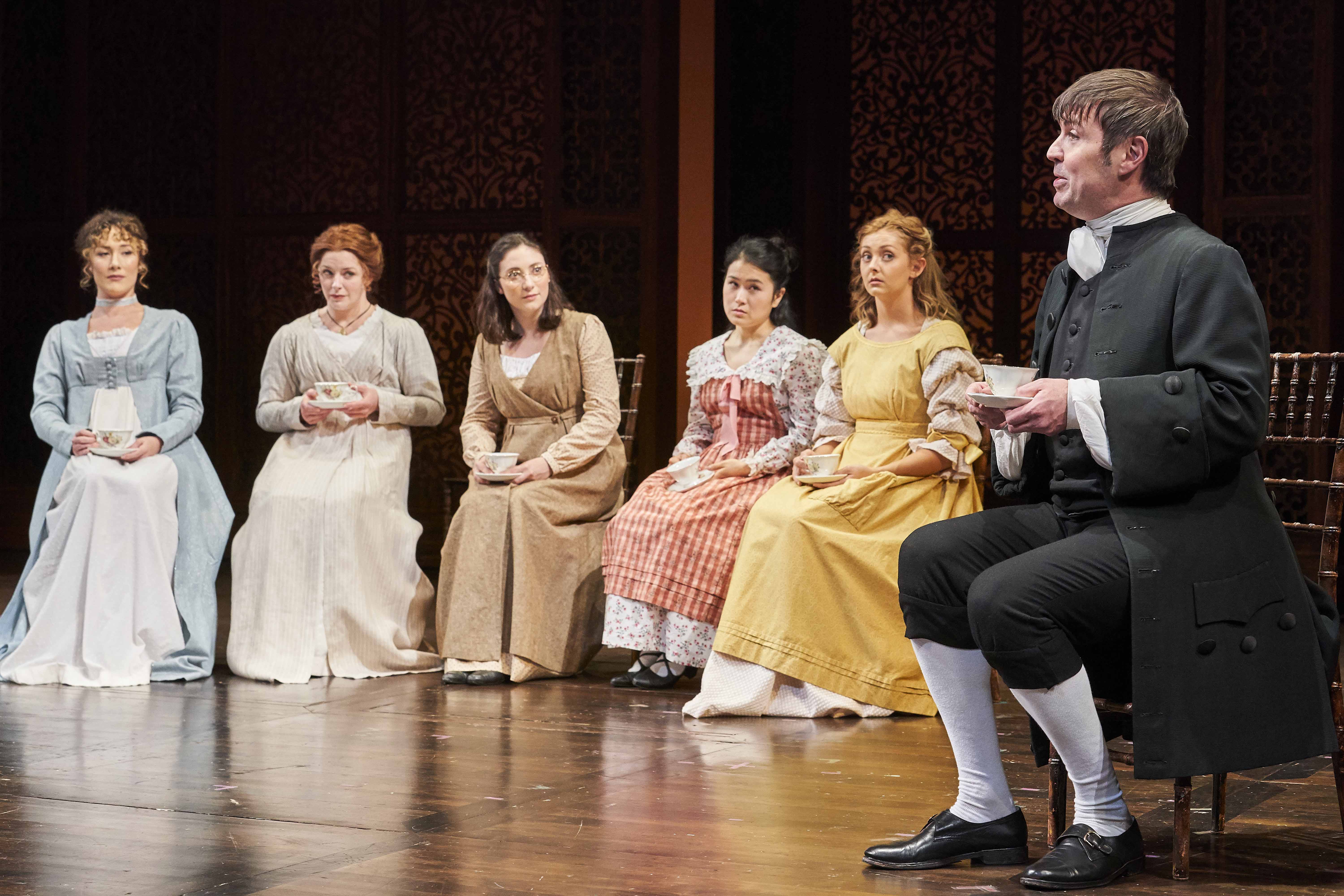Theater critic Bob Abelman reviews a handful of productions from the 2016 Shaw Festival in Niagara-On-The-Lake, Ontario, Canada
By Bob Abelman
‘Mrs Warren’s Profession’ still provocative

Comfort is key in “Mrs. Warren’s Profession.” PHOTO | David Cooper
“Mrs Warren’s Profession,” under Eda Holmes’ direction, is superb in so many ways that a few demand discussion.
Bernard Shaw’s play centers on the relationship between Mrs. Kitty Warren (Nicole Underhay) and her 22-year-old daughter Vivie (Jennifer Dzialoszynski), who just completed a degree at Cambridge and is transitioning to a career as an actuary in London.
Vivie learns over the course of the play that her mysteriously single and long-estranged mother is a former prostitute and current brothel owner. When confronted, Kitty boldly defends her career choice in light of the limited employment opportunities available to poor women in Victorian Britain. Prostitution, she argues in one of Shaw’s most commanding monologues, is not a moral issue; it’s an economic one. Vivie calls her mother “stronger than all of England.”
But when she learns that her mother continues to work in this profession, driven by the social standing her wealth provides, Shaw — through Vivie — offers biting commentary on the hypocritical state of the Union Jack.
Though Shaw completed the writing of this play in 1893, it was banned by censors and rejected by at least 12 theaters, two music halls, three hotels and two picture galleries because of its focus on — and sanctification of — the oldest profession.
That is, until 1902, when a private performance was presented at a small London theater club exempt from The Lord Chamberlain’s Examiner of Plays.
This private performance becomes the dramatic device for Holmes’ current production. We discover this upon entering the theater as the four well-dressed gentlemen already on stage — present-day members, we are told, of the New Lyric private men’s club (Thom Marriott, Wade Bogert-O’Brien, Gray Powell and Shawn Wright) — welcome us to their performance of “Mrs Warren’s Profession.”
This clever conceit immediately places all of Shaw’s social commentary into a contemporary context without the obvious and often strained artifice of setting the play itself in a more modern time (see my review of “A Woman of No Importance”).
And it gives license to the actors to disregard the Victorian stereotypes on which their characters are drawn and find something more interesting, honest and profound in their portrayals. Underhay’s powerful Mrs. Warren is more savvy entrepreneur than battle-worn whore, and Dzialoszynski’s wonderful Vivie is an intelligent, young pragmatist rather than a morally rigid New Woman.
And by creating a play within a play, the actors start each act by reciting the long narrative stage directions that Shaw is known for, which are often as insightful, interesting and eloquent as the writing that comes after. This also allows the set and scenery to be described rather than constructed, using the New Lyric Club drawing room — gorgeously rendered by Patrick Clark using dark woods and rich leather, and dramatically lit by Kimberly Purtell — as the play’s central location.
All this serves to place our attention on the immensely talented actors on stage and the provocative words Shaw has conjured for their use.
Which is how it should be at a festival that bears his name. CV
On stage
WHAT: “Mrs Warren’s Profession”
WHERE: The Royal George Theatre, 85 Queen St., Niagara-on-the-Lake, Ontario
WHEN: Through Oct. 16
TICKETS & INFO: $35-$117. Call 800-511-7429 or visit shawfest.com.
‘Alice’ curiouser but none the wiser

Quite a range of characters populates this “Alice.” PHOTO | David Cooper
It may be one of the most published books in history, but Lewis Carroll’s “Alice’s Adventures in Wonderland” — with its literary nonsense, disorienting rhythms and fantastic characters — does not translate well to the stage. At least not in the production currently on stage at the Shaw Festival.
Director Peter Hinton’s musical adaptation, which has been three years in the making, embellishes the surreptitious imagination that drives young, Victorian-era Alice’s journey into a rabbit hole and the upside-down world she encounters there. And he does so by using state-of-the-art technology and brilliant design to create visually stimulating and often astounding images.
But the story gets blinded by the dazzling special effects, sacrificing emotional resonance for theatrical extravagance. And then it gets blindsided by the original but mind-numbing songs by music director Allen Cole.
The show opens in true Shaw Festival fashion — with the performance space filled with glorious stagecraft that immediately establishes a vivid sense of time, a profound sense of place and a singular perspective. And it displays painstaking dramaturgy, for the curtain rises to reveal a recreation of the origin of this now-classic tale.
We find Charles Dodgson (Graeme Somerville), an Oxford mathematician and clergyman who would call himself Lewis Carroll in his writings, improvising his surreal story while rowing down the Thames on a lazy summer afternoon with the daughters of his employer — one being 10-year-old Alice Liddell (a terrific Tara Rosling).
The mechanized boat floats across the stage as if on water, which is a remarkable illusion created by the reflective surface of Eo Sharpe’s set, Kevin Lamotte’s lush lighting, John Lott’s ambient soundscape, and Beth Kates and Ben Chaisson’s animated, pastoral projections on a rear screen. The scene is further enhanced by William Schmuck’s perfectly period costuming.
And when Alice tumbles into the rabbit hole, the illusion is manifested by a combination of these elements plus flight rigging and another layer of animated projection on a transparent scrim that drops in front of the action. The effect of deeper, richer dimensionality on stage is absolutely mesmerizing.
As the play progresses, more of the same follows — more elaborate staging, more exquisite costuming, more layered projections — which soon overpowers the story and draws our attention away from those who populate it. And the music, which contributes nothing to the play’s progression and even less to the development of its characters, sucks some of the life out of the room.
The production also offers moments of truly inspired and understated artistry, such as constructing the Caterpillar Alice encounters out of six actors (headed by Jay Turvey) who move in synchrony by way of Denise Clarke’s imaginative choreography. But such moments are too few and far between to carry this show or keep those overstimulated but underserved souls who left during intermission from doing so. CV
On stage
WHAT: “Alice in “Wonderland”
WHERE: The Festival Theatre, 10 Queen’s Parade, Niagara-on-the-Lake, Ontario
WHEN: Through Oct. 16
TICKETS & INFO: $35-$117. Call 800-511-7429 or visit shawfest.com.
‘Our Town’ hits home

A scene from Thornton Wilder’s “Our Town.” PHOTO | David Cooper
The poignancy of Thornton Wilder’s 1938 classic “Our Town” — its ability to inspire reflection on what the show’s narrator refers to as the “way we were in our growing-up and in our marrying, and in our living, and in our dying” — is particularly present in this Shaw Festival production.
In part, this is because the flower-lined streets of historic Niagara-on-the-Lake just outside the playhouse entry bear uncanny resemblance, in disposition and design, to the early-1900s New Hampshire town of Grover’s Corners so beautifully described by the play’s stage manager (the gently authoritative Benedict Campbell).
It’s not just the summer humidity that hits you hard upon leaving the conditioned air of the theater; it’s the nostalgic reverie hitting home while walking through a living, breathing Grover’s Corners equivalent.
But mostly, it’s the artistic vision of director Molly Smith and the outstanding performances of the ensemble cast that bring out the overriding innocence that permeates this play and all the emotion we attach to that quality.
At its core, the quiet and contemplative “Our Town” tells the story of neighborhood playmates George Gibbs and Emily Webb (the charming and very approachable Charlie Gallant and Kate Besworth), who fall in love over an ice-cream soda at Morgan’s corner drugstore, marry in the Grover’s Corners Congregational Church after graduating from high school, and go their separate ways when Emily dies bearing their second child.
This production embraces all the stripped-down and now-clichéd theatricality required of any performance of “Our Town.”
Ken MacDonald’s set design offers the indispensable, dreamlike limbo of an empty stage accented with just a few white chairs, a floor of white wooden planks, a white scrim backdrop, and oversized white stepladders and fly-in fencing that help establish locations.
Lighting designer Kimberly Purtell and costume designer William Schmuck provide just enough color to give life to the phantoms on stage who represent town physician Dr. Gibbs and his wife (Patrick Galligan and Catherine McGregor), newspaper editor Mr. Webb and his wife (Patrick McManus and Jenny L. Wright), and all the others who have been called back into existence for the sake of storytelling.
Actors pantomime props and provide just enough comic relief to reflect the foibles of the human condition deemed particularly noteworthy by the playwright. And performances are pitch-perfect save for a few New Hampshire accents that come by way of Boston.
But director Smith brings just a little bit more to the table, which adds to this play’s poignancy and the gratification of witnessing it.
During introductions of characters and pivotal moments in the narrative, actors briefly freeze in midmotion to create the kind of experiential snapshots that make up our long-term memory.
When Emily, now passed, foolishly chooses to revisit a day in her life and learns the play’s key moral — that no one ever realizes life while they live it — props replace pantomime, which adds cumbersome weight to the land of the living and subtly drives home this point.
And in the graveyard, when we share time with the dead in the final act, the white color of the floor has seeped into the clothing, as if they have blended into their final resting place. Their very existence, it seems, becomes increasingly invisible to the living and the living become increasingly inconsequential to them.
By merely augmenting the world created by Wilder rather than giving into the temptation of re-envisioning it, as many contemporary productions have, all the intended human truths are revealed in all their intended simplicity. As such, this is as fine a production of “Our Town” as one is likely to find. CV
On stage
WHAT: “Our Town”
WHERE: The Royal George Theatre, 85 Queen St., Niagara-on-the-Lake
WHEN: Through Oct. 15
TICKETS & INFO: $35-$117. Call 800-511-7429 or visit shawfest.com.
‘Uncle Vanya’ offers melancholy by the metric ton

A scene from “Uncle Vanya.” PHOTO | Emily Cooper
Anton Chekhov sure is a buzz kill.
It’s been said that, through stories like “The Seagull” and “The Three Sisters,” the late-19th-century Russian playwright explores the depths of human nature by crossing the fine line between comedy and tragedy.
Perhaps, but his “Uncle Vanya” certainly tilts toward the tragic.
It takes place on the deteriorating country estate of the widower Serebryakov (David Schurmann), an aging academic who now lives in the city. Running the estate are his daughter Sonya (Marla McLean) and his brother-in-law Vanya (Neil Barclay), who use the earnings from the property’s farm to support Serebryakov. He returns with the intention of selling the estate to help support his new, much younger wife, Yelena (Moya O’Connell), whose beauty and disengagement entrance everyone.
The reason it does is because everyone in this play is needy and hopeless and yearning for the one thing they will never obtain, and they see Yelena as the source of their satisfaction: Serebrayakov seeks respect, Vanya wants to be appreciated, Sonya desires love, the country doctor Astrov (Patrick McManus) pines for any kind of connection, and so on.
As for Yelena, she wants everything she has sacrificed by marrying this old, ill, self-involved man, which is nothing that can be supplied by anyone in the room.
Shakespeare famously wrote “all the world’s a stage.” For Chekhov, all the world’s a stage of chronic depression.
Artistic director Jackie Maxwell not only selected this challenging play for her final season at the Shaw, placing herself as director, she also chose Pulitzer Prize-winning American playwright Annie Baker’s adaptation of the work.
Baker contemporizes “Uncle Vanya” — that is, she turns classic melodrama into rich and weighty melancholy, translates Russian values into something more universal and modern, and transforms things that are acidic into bittersweet. This requires a superb core of actors to pull it off and a game director to steer them in the right direction.
She does and they do.
Free of accents and exaggerated affectations, performances are honest and accessible. While the original story and text remain intact, Baker provides greater opportunities for humor and tenderness, which the cast handles with aplomb and, no doubt, an immense sense of gratitude.
One such opportunity comes on a sleepless night in the second act, when Astrov shares a late-night meal and intimate conversation with Sonya, and then Sonya drunkenly shares her attraction to the doctor with Yelena. Both the actors and the audience get to exhale for the first time in this play.
Rambling speeches, of which there are plenty and most often assigned to Astrov, play easier on the ear with their newfound modern vernacular and contemporary cadence.
And Chekhov’s proclivity for pregnant, overly dramatic pauses is better used to capture the boredom of life on the farm and the overriding dissatisfaction characters feel in each other’s miserable company, which is where more humor resides.
Sue LePage’s simple costuming and set design decorate the Court House’s open performance space with heavy wools and just enough dark wood furnishings and period artifacts to set the scene. This grounds all that is innovative in Baker’s writing and Maxwell’s direction in things traditional, which helps maintain the integrity of the original.
Chekhov is still a buzz kill. But here, there’s more pleasure in the pain. CV
On stage
WHAT: “Uncle Vanya”
WHERE: Court House Theatre, 26 Queen St., Niagara-on-the-Lake
WHEN: Through Sept. 11
TICKETS & INFO: $35-$117. Call 800-511-7429 or visit shawfest.com.
‘A Woman of No Importance’ undermined by its updating

“A Woman of No Importance” runs quite the elegant gamut. PHOTO | David Cooper
No, Oscar Wilde’s “A Woman of No Importance” is not the best of the four society comedies he wrote between 1891 and 1895.
It’s been said that while “Lady Windermere’s Fan,” “An Ideal Husband” and “The Importance of Being Earnest” swim in melodrama, this one fails to come up for air.
And while Wilde’s plays typically offer a handful of likable characters, this one has none and everyone’s lines are lessons in conventional Victorian morality.
But no play better chronicles the pleasure of belonging to the best of high society and the pain of being cast from it, which evocatively reflects the public shaming Wilde was experiencing while this was in performance at London’s West End.
Being found guilty of subversiveness and sodomy destroyed Wilde’s career — a career that too quickly went from poetry to prose to prison — and, ultimately, destroyed the playwright himself.
But not before Wilde penned this portrait of the shame of an unwed mother desperately trying to conceal the truth from her son and an unforgiving society.
At a gathering at the Hunstanton estate in England, a group of high-society friends is celebrating the presence of the much-adored Lord Illingworth (Martin Happer) and his recently appointed secretary, Gerald Arbuthnot (Wade Bogert-O’Brien). This is a big promotion for young Gerald, who grew up without resources, prospects or a father. But when his mother Rachel (Fiona Byrne) realizes that her son’s new boss is actually his father — the man who abandoned her as a pregnant teen — she tries to put a stop to it.
Wilde most succeeds in this play when he moves from preaching about social injustice, albeit with delicately rounded sentences, to pleading for tolerance in a world that is apt to be harsh. He gives Rachel a voice and a platform for it.
Where this otherwise well-acted, beautifully produced production falters is in director Eda Holmes’ decision to take this play out of Wilde’s time and into 1951.
The purpose of this temporal transportation is to bring this work closer to our own time in the hope of revealing how similar social injustices still exist. Wilde’s England was experiencing an end to Victorianism and the crumbling of the most formidable conventions and firmest convictions. In the early 1950s, when the Conservatives ousted the Labour government after the end of the World War II, gender roles and moral codes also were in transition.
Going from 1883 to 1951 also gives license to designers Michael Gianfrancesco (set and costume), Kevin Lamotte (lighting) and John Gzowski (music and sound) to stretch and strut their craftsmanship, which they do marvelously.
But this time shift is a distraction considering how the words, wit and exposed hypocrisies are so deeply tied to Wilde’s era. And, of course, it draws the play away from Wilde’s own turmoil.
The thing is, those in the audience are more than capable of drawing parallels between Wilde’s timeline and our own — on our own. Case in point: Early in the play, estate owner Lady Hunstanton (Fiona Reid) observes that “politics are in a sad way everywhere … they certainly are in England.” In light of Britain’s recent withdrawal from the European Union, the audience laughed larger, louder and longer than the line would otherwise have warranted.
If you can get past this production’s creative misstep, there’s still plenty in this play and its presentation to relish. CV
On stage
WHAT: “A Woman of No Importance”
WHERE: The Festival Theatre, 10 Queen’s Parade, Niagara-on-the-Lake
WHEN: Through Oct. 22
TICKETS & INFO: $35-$117. Call 800-511-7429 or visit shawfest.com.
Bob Abelman covers theater and cultural arts for the Cleveland Jewish News. Follow Bob at Facebook.com/BobAbelman3.
Originally published in the Cleveland Jewish News from June 29 through July 3, 2016.
Lead image: Comfort is key in “Mrs. Warren’s Profession.” PHOTO | David Cooper











